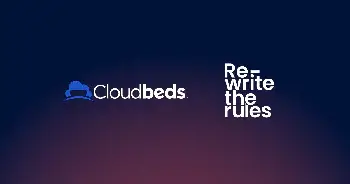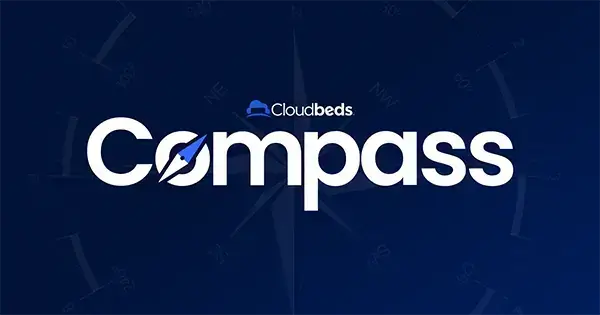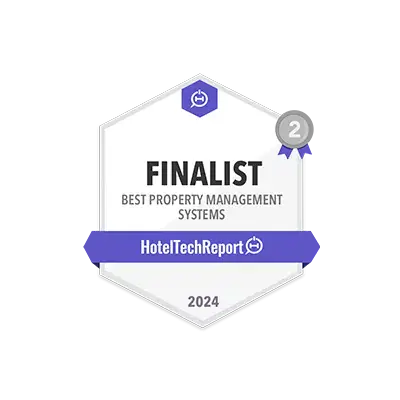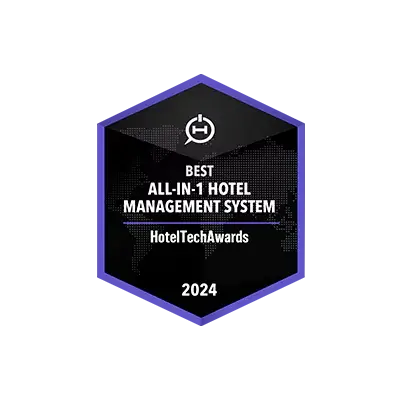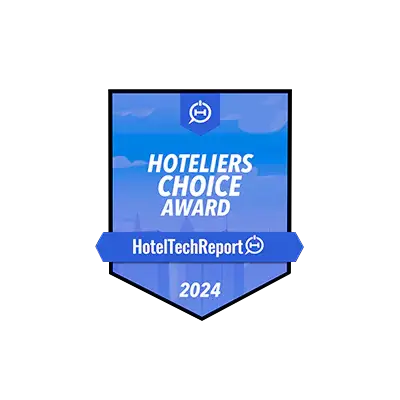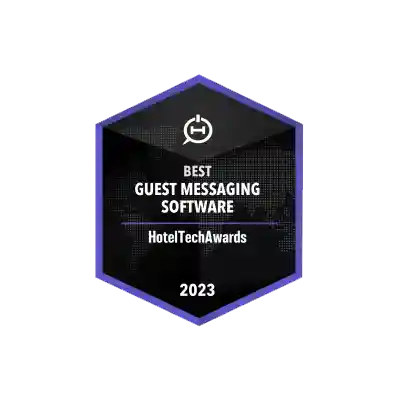
By Cloudbeds
When travelers make a hotel reservation, they expect a seamless experience, or they may decide to stay elsewhere. For hotels, meeting this expectation means moving away from manual processes and investing in booking software that allows travelers to book a room when they want on the channel of their choice.
Whether online or offline, behind every effortless booking experience is a fast, reliable, and fully integrated hospitality management system. Here we explain how hotel reservation systems work, the key benefits of an integrated platform, and what to look for when selecting reservation software.
We’ll also show you how to harness this powerful technology to capture more reservations, streamline booking processes, save time and costs, and increase guest satisfaction – whether you operate a hotel, hostel, motel, B&B, or vacation rental company.
What is a hotel reservation system?
A hotel reservation system is software used in the hotel industry to manage room inventory, rates, and bookings. It may be housed within the hotel’s property management system (PMS) or may be standalone software connected to the PMS.
The reservation system acts as the central hub of the reservation ecosystem, which may also include a website booking engine, channel manager, and revenue management system. When integrated, these modules work together to help hotels manage room availability, distribution, reservations, and revenue.
How do hotel reservation systems work?
First, the hotel’s revenue manager loads the hotel’s rate codes, inventory, and restrictions into the system. The information is then populated into the PMS and distributed to the hotel’s booking channels with the help of channel management software. These channels may include the hotel’s website booking engine, online travel agencies (OTAs), the global distribution system (GDS), wholesalers, and metasearch sites.
When a traveler books a hotel room on one of these channels, the information is passed back to the reservation system and the PMS, where it is stored for retrieval when they check in. At the same time, availability is updated on all distribution channels.
Of course, this process is contingent on two-way connectivity between the reservation system and the other components. If the components aren’t integrated, the revenue manager must perform these tasks manually, a time-consuming and error-prone process.
Hotel reservation system vs. booking engine
The terms “hotel reservation system” and “hotel booking engine” are often used interchangeably in the hospitality industry, but they actually refer to different things. A hotel reservation system is the central hub where reservation information is stored from all booking channels, whether by phone, OTA, GDS, sales department, or online booking engine. A website booking engine, also called an internet booking engine (IBE), is software that allows guests to make a reservation directly on the hotel’s website.
9 benefits of using hotel reservation software
While most hotel chains and mid-sized properties moved to a digital booking system years ago, a surprising number of small hotels, hostels, inns, B&Bs, and vacation rental operators still use manual processes. This puts them at a distinct disadvantage over their more tech-forward competitors.
Here are just a few of the benefits of using a hotel reservation system:
1. Meet traveler expectations
Travelers want to book a room without having to email the hotel or wait on hold. With a website booking engine, guests can make online hotel bookings at any time, from anywhere – generating reservations while you sleep.
2. Increase efficiency
By automating tasks like rate shopping, inventory management, guest communication, and email confirmations, an integrated hotel reservation system reduces labor costs, prevents costly errors, and frees staff to handle more complex tasks.
3. Save on travel agent commissions
When guests book directly on your website, you don’t pay a hefty commission to an intermediary. That’s why direct bookings are typically a property’s most profitable booking channel.
4. Offer multiple booking options
You can advertise multiple room types, promotions, and packages on your website or social media channels, targeting a broad range of traveler budgets and tastes. Many third-party sites don’t offer this flexibility.
5. Generate more revenue
When travelers book on your website, you can upsell them to premium rooms and cross-sell onsite services and add-ons like breakfast, dining, spa, and recreation.
6. Build guest relationships before arrival
Most OTAs don’t share guest contact details when forwarding a booking. When guests reserve through your website, you collect this information directly. Using guest messaging tools, you can invite them to start planning their stay, upgrade their room, or order an amenity.
7. Reassure travelers and protect your bottom line
When travelers book through your website, they can make changes or cancel directly with your property, giving them peace of mind. As a lodging operator, you can implement deposit and cancellation policies as a safeguard in case of no-shows.
8. Manage rates and availability in real-time
With a channel manager integrated with your reservation system, you can simultaneously update pricing and availability on all booking channels. This will help you increase occupancy, maintain rate parity, and prevent pricing errors, overbookings, and lost sales.
9. Automate your credit card payment processing
With a payment gateway connected to your booking engine, credit cards are automatically validated, and deposits are processed quickly, reducing input errors, delayed payments, and chargebacks.
Features to look for in a reservation management system
There are lots of options when it comes to choosing a hotel reservation system. To find the best software solution for your hotel operations, look for the following key features:
- An open, cloud-based platform that is easy to implement and maintain, is accessible from any device with an internet connection, and can scale with your business.
- Integration with your hotel’s property management software to provide automatic updates to guest information rather than manually transferring data from one platform to another.
- Two-way connectivity with channel manager and revenue management software to optimize distribution, and pricing, and avoid double bookings.
- A customizable, user-friendly, and commission-free booking engine to drive bookings across your website and social media channels.
- A built-in rate comparison widget to keep visitors on your website and give them the confidence they’re getting the best deal.
- A mobile-friendly booking experience. Euromonitor estimates that 1 in 4 travel bookings will be on mobile by 2024.
- Built-in reporting and analytics with powerful data insights to help you understand purchase behavior and preferences.
- Language and currency functionality to help international guests complete reservations in their preferred language and currency.
- A secure system that adheres to privacy regulations and ensures guest information and payment details are safely stored.
- Customer support staff specializing in hospitality to help you address challenges and optimize your processes.

10 best hotel booking systems in 2024
Discover the top hotel reservation systems that receive high ratings from hoteliers.
1. Cloudbeds
Cloudbeds provides a cloud-based, fully integrated hospitality management platform with all the tools you need to ensure a seamless reservation process. See the section below for more information.
2. Amadeus
Amadeus offers comprehensive distribution and management solutions that centralize booking operations and enhances revenue management.
3. Cendyn
Cendyn offers a flexible, scalable reservation system with intelligent rate and inventory management tools.
4. Frontdesk Anywhere
Frontdesk Anywhere is a cloud-based hotel management software with an integrated PMS, channel manager, booking engine, and revenue management system built for independent hotels and management groups.
5. Guestcentric
Exclusively designed for large, independent hotels and small groups, Guestcentric’s CRS features an integrated booking engine and a Partners Integration Marketplace.
6. Protel
Based in Germany, Protel is a legacy PMS provider that also offers a website booking engine, mobile app, and events software.
7. Resnexus
Based in the United States, Resnexus is a cloud-based PMS popular with bed & breakfasts and inns that offer a website and booking engine along with guest management, credit card processing, and automatic yield management.
8. RMS Cloud
RMS Cloud features an integrated PMS, booking engine, channel manager, and revenue management system suitable for all types of lodging operators.
9. SHR
SHR’s Windsurfer CRS is popular with hotel groups, offering revenue management software, a customer relationship management (CRM) system, and call center services.
10. SiteMinder
SiteMinder is a market-leading platform that comes with market intelligence and a top solution for optimizing pricing, rate plans, inventory, and channels.
Why choose Cloudbeds’ hotel booking system
Cloudbeds offers a fully integrated, cloud-based, hotel reservation system designed specifically for independent properties. With Cloudbeds, you have all the core components needed to run your property. Staff can operate the platform from a single, easy-to-use interface and only need to deal with one technology partner for support.
Cloudbeds offer lodging operators:
- An award-winning, intuitive PMS with built-in reservation capabilities, a drag-and-drop calendar, powerful reporting and analytics, and email automation.
- A channel manager providing access to 300+ booking channels, including Booking.com, Expedia, Airbnb, and Vrbo, with zero added commissions.
- A commission-free booking engine to help you convert more of your own website visitors and grow direct bookings.
- A Pricing Intelligence Engine featuring a rate manager, rate shopper, and automated rules and notifications (and additional RMS integration partners)
- An integrated hotel payment processing solution with a built-in payment gateway to make online reservations and payments quick, easy, and secure.
- A guest experience platform to engage and delight guests at every stage of the guest journey, from discovery to post-stay.
- A digital marketing solution to maximize your online presence and drive more direct reservations.
All these tools are fully integrated, meaning bookings, rates, and availability are always in sync. There’s no need to switch between multiple software tools or deal with multiple vendors. Cloudbeds also offers access to an integration marketplace so that hotels can add tools that make the most sense for their business.

